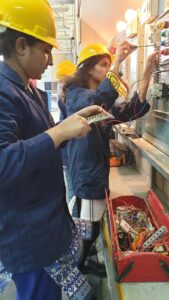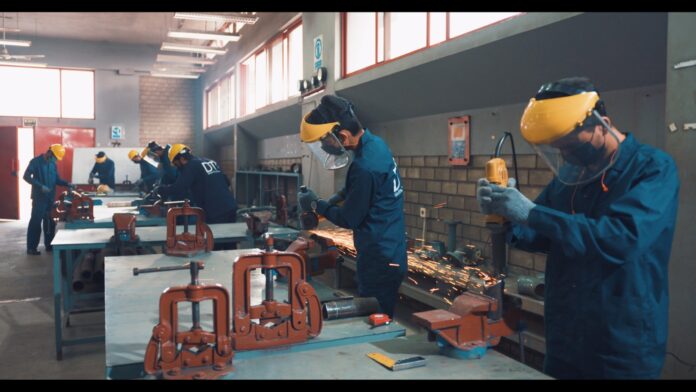For young Pakistanis from lower-income backgrounds, the journey to financial independence and stable employment can often seem daunting. Many lack access to higher education or the resources to pursue traditional career paths. DTI (Descon Technical Institute), a leader in vocational training in Pakistan, is committed to changing this by providing practical skills that enable young people to build meaningful careers in various technical fields. DTI’s mission is to uplift these communities by equipping the youth with the competencies needed to meet industry demands, empowering them to secure employment and break free from the cycle of poverty. Through accessible training and a robust curriculum, DTI is preparing students to not only enter the workforce but also to contribute meaningfully to Pakistan’s growing industries.
DTI offers a wide array of technical and vocational training courses aimed at equipping young Pakistanis with in-demand skills for sustainable livelihoods. Designed to meet industry standards, DTI’s curriculum encompasses following specialized trades:
Welding: Covering both pipe and plate welding, DTI’s welding program ensures that students, many of whom come from under-resourced backgrounds, gain hands-on skills aligned with industry standards. These competencies open doors to roles in sectors where precision and expertise are highly valued.
Electrical: With courses in electrical installation, PLC programming, and maintenance, DTI prepares students for jobs in industries that have a strong demand for electrical expertise. By providing practical training, DTI provides students who cannot afford traditional costly education, alternate routes while still attaining skills that enhance employability.

QHSE (Quality, Health, Safety, and Environment): Offering globally recognized certifications such as NEBOSH-UK and IOSH-MS, DTI’s QHSE program enables students from varied backgrounds to gain credentials respected worldwide, making them valuable assets for organizations with rigorous safety standards.
Automation: In the era of digital transformation, DTI offers training in automation systems, including programming and control systems. These courses provide students with industry-relevant skills, making them competitive candidates for tech-forward industries without the prohibitive costs of formal higher education.
Fabrication
DTI’s fabrication courses focus on metalworking, equipping students with hands-on skills for the construction and manufacturing sectors. This training prepares them to excel in local projects or establish small-scale businesses in their communities.
Carpentry
DTI’s carpentry courses provide practical expertise in woodworking, enabling students to take on roles in construction or launch small businesses. The skills gained empower them to contribute meaningfully to their communities.
Civil Training
DTI’s civil training programs cover essential areas like quality surveying, preparing students for critical roles in Pakistan’s infrastructure development. With a focus on real-world applications, these courses empower graduates to secure stable careers and contribute to regional growth and development.
Millwright Training
DTI’s millwright training focuses on machinery maintenance, equipping students with the technical expertise needed in high-demand industries. This training opens pathways to stable employment, enabling graduates to support their families and drive economic progress in their communities.
Each of these programs is designed not just to educate but to build competence in real-world applications, an approach that has earned DTI over 35,000 graduates across Pakistan. DTI’s offerings have grown to include more than 60 courses, with both in-person and virtual options, under the guidance of over 50 experienced instructors across 20 dedicated workshops.
DTI’s programs serve as a powerful engine for socioeconomic mobility. By empowering individuals with marketable skills, DTI enables graduates to secure stable employment and improve the quality of life for themselves and their families. This economic uplift extends to local communities, as DTI-trained professionals contribute to Pakistan’s economic landscape and drive regional development.
Through a commitment to providing skills for livelihood, DTI’s training aligns with Pakistan’s broader goals of poverty alleviation and youth empowerment, making a meaningful difference in the lives of individuals and communities alike.
DTI’s Industry Partnerships:
A core component of DTI’s success lies in its robust partnerships with industry leaders and employers who recognize the value of a skilled workforce. By collaborating with these organizations, DTI tailors training programs to meet specific industry demands, thereby ensuring that graduates possess the competencies that employers seek.
Employers benefit from the partnership as they gain access to a pool of skilled professionals who can meet their operational needs and contribute to higher productivity and safety standards. Many employers praise DTI’s graduates for their reliability and readiness, affirming DTI’s role as a trusted provider of skilled labor.
Global Contributions and National Pride
A growing number of DTI alumni are finding opportunities abroad, including on Descon’s international projects. These individuals not only achieve financial independence but also serve as ambassadors of Pakistan’s skilled workforce, earning foreign exchange that strengthens the national economy. This contribution underscores the global relevance of DTI’s training programs, which empower individuals to compete and excel in international markets.
Skilled workers are the backbone of many industries, from construction and manufacturing to technology and health and safety. Through their expertise, resilience, and work ethic, they drive industrial growth and infrastructure development while ensuring the smooth functioning of operations. Recognizing the dignity and respect these workers deserve, DTI celebrates their invaluable contributions through its “Hands On – Hats Off” campaign—uplifting workers while honoring their indispensable role in society.
Innovating in Vocational Education
DTI is committed to continuous improvement and innovation in vocational training. The institute tackles the unique challenges vocational institutions face in Pakistan, such as limited access to modern equipment and evolving industry standards. By embracing technological advancements and refining its curriculum, DTI stays ahead of these challenges, equipping students with skills that remain relevant in a rapidly changing job market.
In addition, DTI is the first accredited NEBOSH Learning Partner in Pakistan to achieve Gold status, a testament to the institute’s commitment to high-quality education in health and safety. This recognition underscores DTI’s focus on excellence, which translates to well-prepared graduates who make significant contributions to their fields.
As the demand for skilled labor in Pakistan continues to grow, DTI’s vision remains steadfast. The institute is actively working to expand its reach to new industries and enhance its programs to adapt to the shifting landscape of the workforce. DTI aims to broaden its curriculum, increase its capacity for virtual and on-campus learning, and develop partnerships across a wider range of industries.
Through these efforts, DTI not only strengthens the pipeline of skilled workers in Pakistan but also builds a foundation for sustained organizational success. Employers across sectors can look to DTI-trained graduates as assets who bring valuable skills, resilience, and a strong work ethic to their roles.




